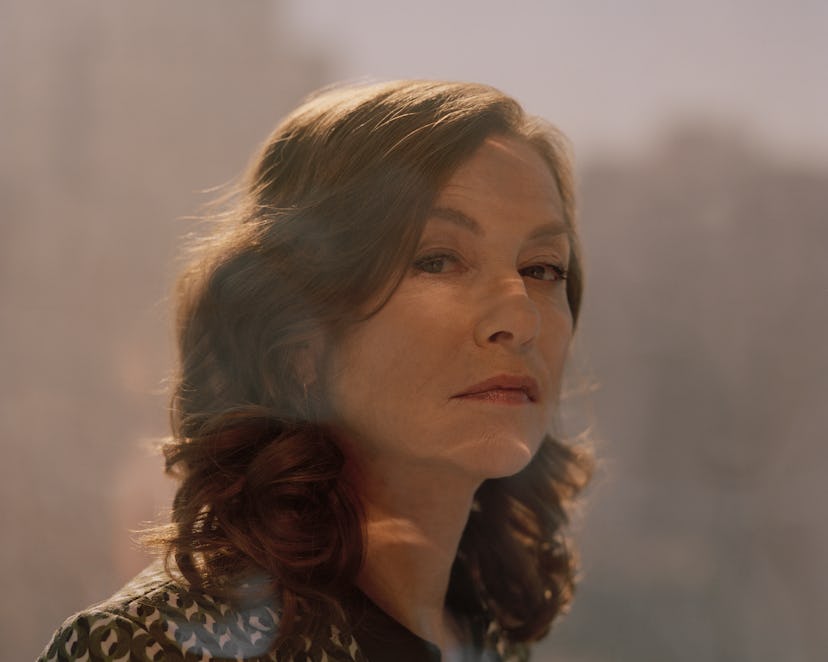At 63, Isabelle Huppert Is Cooler Than Ever
The unflappable French icon is having a banner — dare we say Oscar-worthy — year, with her acclaimed new films Elle and Things to Come, and a retrospective of her work in New York.

Though Isabelle Huppert’s Michèle Leblanc dominates nearly every frame of Elle, Paul Verhoeven’s French thriller that wowed audiences at Cannes earlier this year and which recently opened in the U.S., the first character we see is her cat. Despite appearing in over 100 films, the iconic French actress had never worked with a trained feline. “It’s like an actor,” she said last week in New York. “The scene where he jumps into my arms — it was impressive! He did it, like, 10 times.” The anecdote is charming, but the scene, which opens the film, is not: As the cat idly watches, Michèle is brutally raped.
But it isn’t the rape — or the repeated attacks (whether or not they are flashbacks) — that makes Elle so provocative, it’s Michèle’s response to it. After her assailant leaves, she sweeps up some glass that was shattered in the attack, takes a bath, and orders in sushi. “Everything is so matter of fact,” Huppert explained. “Imagine if after the rape I was in tears saying, ‘Oh my god, what happened to me?’ It would be a different film.”
Curled up in the corner of an L-shaped couch at a photo studio, there was something feline about Huppert, who was in New York to introduce a retrospective of her work at the Lower East Side’s Metrograph theater over the weekend. At 5’3”, she’s much smaller than she appears on camera, which is not simply a matter of screen proportions — hers are ideal — but also temperament. There is the sense that although we seemed to be getting along just fine, if I said or asked the wrong thing, she would smoothly put me in my place. It’s the same thing that makes her so thrilling to watch on film.
At 63, the actress is enjoying a landmark year. In addition to Elle, she was in Souvenir, in which she plays a fading songstress, and Things to Come, directed by the up-and-coming French director Mia Hansen-Løve. In the film, out December 2, she plays a philosophy teacher grappling with both the death of her mother and an unfaithful husband. Though the film presents a much softer version of Huppert than Elle’s Michèle, there is some overlap: “There’s a cat in that film too,” she said, noting that this one wasn’t trained. “A huge cat, very heavy like an elephant — and I was supposed to carry him all the time.”
But it is Elle that’s generated the most buzz this Oscar season, both for its daring subject matter and for Huppert’s enthralling performance — one that, if you believe everything you read, we were nearly robbed of.
The origin story is that Verhoeven had first planned to cast an American actress in the role of Michèle, but each of the actresses he approached found the material too controversial. “That’s what Paul likes to say,” said Huppert. “It’s the ultimate provocation.” Regardless, one cannot imagine anyone but Huppert, who has long been among French cinema’s coolest provocateurs, in the role for the same reasons one cannot imagine someone else as the lead in Michael Haneke’s The Piano Teacher or in Claude Chabrol’s La Cérémonie. Rather than molding herself around her characters, Huppert’s characters mold themselves around her — the very definition of star power.
That isn’t to say that Huppert lacks range; her filmography is testament to that. Rather, it’s that she puts enough of herself into each character to make them undeniably her own. As she put it, “I play a different person — and that person happens to be me in the end.”
Perhaps that’s why she rarely, if ever, is offered direction. This was especially true of the 12 weeks shooting Elle. “Paul and I never said one word. We said ‘hello’ and ‘goodbye’ and that’s it,” said Huppert, playfully. “He literally let me take that huge piece of material. I felt like a sculptor to whom you give a huge piece of wood.” A different actress may have sensationalized Michèle’s trauma rather than internalized it — hello, Academy! — which makes the Oscar hype surrounding Huppert’s sardonic, understated performance all the more satisfying.
Still, she described Verhoeven, who also made Basic Instinct, as “obsessive” when it came to achieving his vision. “He won’t let it go until he really gets what he wants,” she said. “He’ll have you repeat it over and over.” If repeating a rape scene, or a masturbation scene, or a scene in which your mother dies, or a scene in which a dead, serial killer father is confronted — Michèle is nothing if not implacable — sounds hard to bear, it’s exactly what draws Huppert to a role.
“I would have a much harder time just playing soft characters,” she said. “That would be hard for me.”
Although her characters often suffer immensely — Jean-Luc Godard once told her that her character in Every Man For Himself was “the face of human suffering” — Huppert never seems to suffer for her craft. Rather, she seems to garner only pleasure from the process of making films, and particularly from working with the brilliant but exacting directors like David O. Russell, Werner Schroeter, Haneke, Chabrol and now Verhoeven, with whom she’s achieved her most iconic performances. Maybe she just really loves the movies: she even owns a Metrograph-esque film house in Paris called Cinema Christine 21, which her son curates. And yet, when I asked Huppert what it’s like to watch herself onscreen, her catlike bristliness emerged: “I don’t dare say.”